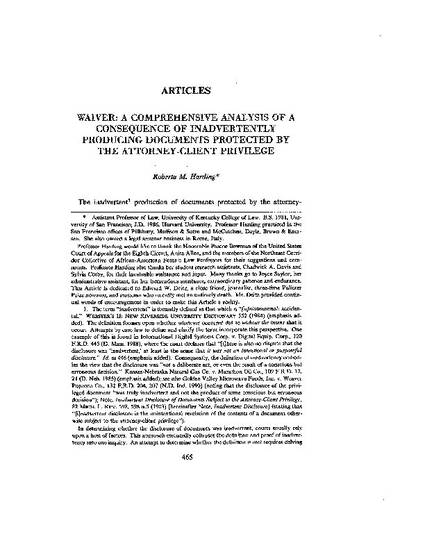
The inadvertent production of documents protected by the attorney-client privilege frequently occurs in contemporary litigation. This phenomena becomes more prevalent as the number of cases involving inadvertent document production grows. Unfortunately, given the present modes for resolving the waiver issue that stems from this occurrence, this occurrence could threaten to become the rule rather than the exception. The increased frequency of inadvertent document production is due primarily to more disputes arising out of production of documents demands by the opposing party that emerge as parties request the production of an increasing number of responsive documents. As a result, the sheer quantity of documents being produced facilitates the inadvertent production of materials protected by the attorney-client privilege.
When the privileged documents are inadvertently produced, a multitude of problems and issues emerge. One of the most critical issues is whether the inadvertent production of protected documents requires a waiver of the documents’ attorney-client privilege. Presently, federal courts apply three diverse tests – the lenient test, the strict test, and the middle test – to determine whether a waiver results from the inadvertent production. In response to this situation, this Article favors the development and implementation of an alternative test that draws from the strengths of the existing tests and minimizes their inherent weaknesses.
This Article first examines the three tests federal courts currently apply to the issue of attorney-client privilege in connection with inadvertent document production. This Article also considers the problems caused by the courts’ use of three different rules, including the increased uncertainty in the litigation process resulting from the lack of uniformity among the federal district and circuit courts in deciding this issue; the increased risk of forum shopping; the unnecessary expenditure of personal and judicial resources; the uncertainty as to the scope of the waiver if the privilege is deemed waived; and the ensuing frustrations in using this waiver as a tool to “police” attorneys’ activities.
This Articles goes on to examine the two major legal principles in conflict in this issue. An alternative test is proposed that is intended to be applied uniformly to the issue of inadvertent document production and waiver of privilege. The alternative test’s strengths and weaknesses are also critiqued. Lastly, this Article compares the alternative test to each of the existing three tests and concludes that the new test draws upon the strengths of each of the three existing tests, while minimizing the existing doctrinal tension between discovery policy and attorney-client privilege.

Catholic University Law Review, Vol. 42, No. 3 (Spring 1993), pp. 465-510